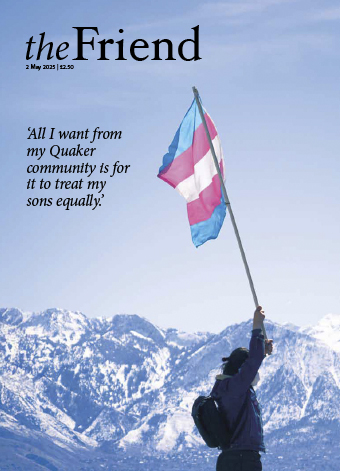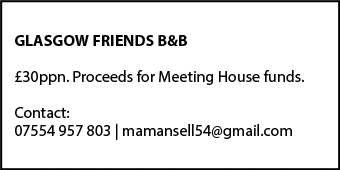
The Friend is a weekly magazine in which Friends speak to each other and to the wider world, offering their insight, ideas, news, nurture and inspiration.
Nurturing Quaker community, each issue offers a space for Friends to share their concerns, and to support each other in faith and witness.
The Friend: enriching, inspiring and connecting the Quaker community since 1843.
Our friend joined us for lunch at Christmas. She is in her late thirties, sociable, a welcome guest. She has a disease for which there is no cure. Her symptoms are predominately physical: walking, eating and drinking are all difficult. Writing and doing other delicate tasks is challenging, erratic and often unsuccessful. An overwhelming tiredness strikes her several times a day, and then she has no alternative but to rest and sleep for a while. Notwithstanding her several talents, there is no possibility for her to find or to hold gainful work or to make a contribution to society, paid or unpaid. Treatment alleviates some of the symptoms.
A recent letter to the Friend asked that, rather than express their grief and anger at the relentless attacks they are facing, trans Friends should explain themselves and share their experience. This is a more subtle form of micro-aggression, similar to those inflicted on people of colour and, mercifully to a lesser extent these days, on gay people. We white, cis, straight people are the default, the ‘normal’, so we don’t need to examine our own experience of race, gender or sexual orientation. It is for the ‘other’, to whom in our complacent generosity we extend tolerance, to explain themselves so that we can understand them and include them. This is neither ‘equality’ nor ‘inclusion’ – it is not a level playing field, and we have no intention of making it so.
You’re almost halfway through your term as clerk to Britain Yearly Meeting trustees. How has it been going?
Surprisingly well. I was very surprised to be asked. I thought that being in my late sixties, and a white middle-class woman, would be against everything we were trying to do in terms of bringing some diversity into the group. But younger Friends have a lot of demands on their lives – young families, careers, elderly parents, and local Quaker commitments – so I could see that I at least had time to offer. Some experience as well.
If anyone reading Andrew Backhouse’s ‘Down to earth’ (18 April) needs further inspiration to explore our Quaker burial grounds, they may find it in an account from ‘Mrs Basil Holmes’ of her graveyard hunting in London in the 1880s and 1890s.


Become a subscriber to enjoy unlimited access to our articles, dating back to 2009! Online subscribers get the Friend to their inbox each week, can comment on articles, and dive into our 1914-18 digital archive too!
Whether you are new to Quakerism or have been going to Meeting for years, you’ll find something here to inspire, inform and challenge you.
News | Views | Reviews
Written by and for Friends on the bench
Subscribe